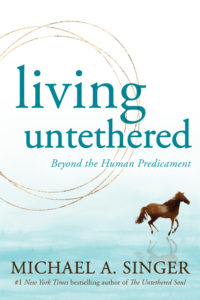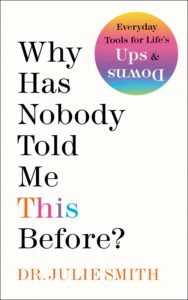Sometimes we get caught up in our own thoughts. Contemplating different viewpoints while working through problems allows us to step back, gain perspective, and reach solutions that may not occur to us on our own. Whether the goal is to improve relationships, become more focused, express ourselves better, or make positive changes in our lives, Smiley Library has an extensive collection of books that offer guidance and wisdom. Here are a few new and popular titles available for checkout.
 Research professor at the University of Houston and author of six #1 New York Times best sellers, Dr. Brené Brown’s latest book “Atlas of the Heart: Mapping Meaningful Connection and the Language of Human Experience” defines human emotions. Fear, curiosity, grief, gratitude–Brown believes that language and being able to name and understand emotions is an important way to give us self-awareness, healing, and connection with one another. She describes over 80 emotions, citing research and sharing stories along the way. The layout is done in a “coffee table book” style, including color pictures, quotes, and diagrams.
Research professor at the University of Houston and author of six #1 New York Times best sellers, Dr. Brené Brown’s latest book “Atlas of the Heart: Mapping Meaningful Connection and the Language of Human Experience” defines human emotions. Fear, curiosity, grief, gratitude–Brown believes that language and being able to name and understand emotions is an important way to give us self-awareness, healing, and connection with one another. She describes over 80 emotions, citing research and sharing stories along the way. The layout is done in a “coffee table book” style, including color pictures, quotes, and diagrams.
Spiritual teacher and author of the bestselling book “The Untethered Soul,” Michael A. Singer’s newest is “Living Untethered: Beyond the Human Predicament.” He explains how resisting uncomfortable things in life causes suffering. As he truthfully says, “No one can make an event that has already happened not have happened” so we should try to accept reality as it is. Exploring consciousness, he helps us realize we are not our thoughts and suggests steps to take to arrive at a place of better understanding and freedom.
 Clinical psychologist and popular vlogger Dr. Julie Smith has reached out to millions through her short social media videos on mental health. She expands on these posts now with her first book, “Why Has Nobody Told Me This Before?” Touching on common emotions such as pain, grief, fear, and stress, she shares the knowledge and techniques she gained through her work as a psychologist and therapist. She clarifies that her book is not “therapy.” It is meant to give you tools to use as you work through difficulties. Practicing these tools helps build a “toolbox” of skills to use during these challenging times.
Clinical psychologist and popular vlogger Dr. Julie Smith has reached out to millions through her short social media videos on mental health. She expands on these posts now with her first book, “Why Has Nobody Told Me This Before?” Touching on common emotions such as pain, grief, fear, and stress, she shares the knowledge and techniques she gained through her work as a psychologist and therapist. She clarifies that her book is not “therapy.” It is meant to give you tools to use as you work through difficulties. Practicing these tools helps build a “toolbox” of skills to use during these challenging times.
Many additional books are available to check out. Others to consider are “Own Your Past Change Your Future: A Not-So-Complicated Approach to Relationships, Mental Health and Wellness” by Dr. John Delony, “The Book of Hope: A Survival Guide for Trying Times” by Jane Goodall, “Speak: Find Your Voice, Trust Your Gut and Get from Where You Are to Where You Want to Be” by Tunde Oyeneyin, and “How to Be Perfect: The Correct Answer to Every Moral Question” by Michael Schur.
Remember, not every style of self-help book is for everyone. If you take something positive from it, become more thoughtful after reading it, and it inspires beneficial change in your life, then I think you’ve found a good one.